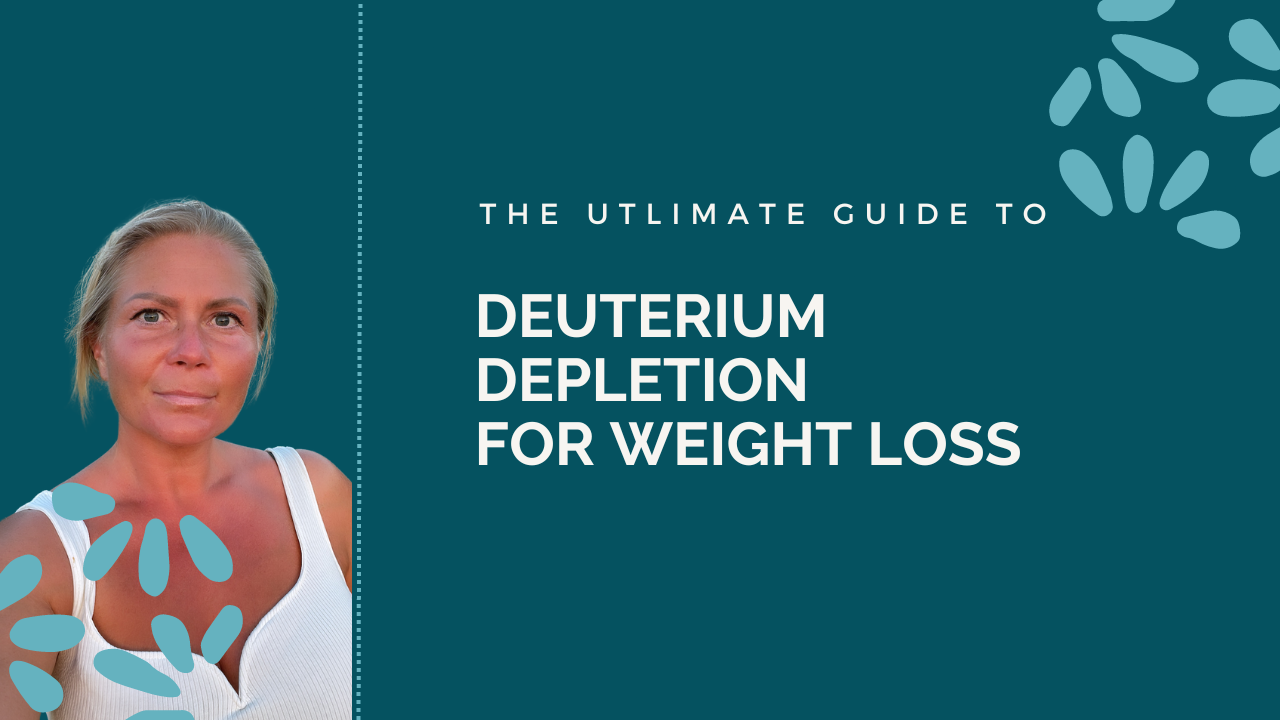
The Ultimate Guide to Deuterium for Weight Loss
You can read The Ultimate Guide to Deuterium for Weight Loss below, or if you prefer the video format, you can watch it on Youtube here.
This article goes over the following topics to help you understand the link between deuterium (heavy hydrogen) and weight gain:
1. How deuterium destroys metabolic function
2. What deuterium is and where it's found
3. How to eat to reduce your deuterium amounts in the body
4. Other deuterium depletion practices
5. Deuterium fun facts
1. How Deuterium Destroys Metabolism
Let's start with why weight gain happens.
Obesity is a sign of leaking energy to the environment. Hard to believe? Here are the 3 examples Dr. Jack Kruse famously brings up to explain this phenomenon:
- When a G-class star, such as our Sun, when it comes to the point where it loses energy it will get bigger.
- When an ankle is inflamed - it loses energy, it swells.
- And when there's heart failure, the heart becomes bigger in size as well.

What deuterium does is it makes your body's energy production go down.
There are several ways our bodies produce energy. One of the ways is through creation of the ATP molecule inside of mitochondria (the elements inside of the cells that are both sensors and powerhouses_.
How exactly does deuterium makes us leak energy, is it breaks down the microscopic motors that spin inside of our mitochondria to produce energy.
Deuterium breaks those nanomotors, because it's too big - it doesn't fit without breaking the subtle mechanism.
And that's only one of the problems with deuterium... We'll discuss the other problems a bit later.
But once you start losing energy, according to quantum mechanics, your body will try to compensate for the loss by increasing mass.
It shouldn't be surprising, after all that this famous equation applies to our bodies too: e=mc2.
So deuterium overload in our tissues leads to obesity and other energy-related, metabolic conditions (Alzheimer's, autoimmune disease, diabetes, etc).
As kids we take advantage of deuterium, because it helps us grow.
But as we reach approximately 20 years of age, our goal should be to reduce deuterium that we are consuming with food and water, and help our body excrete it.
2. What Deuterium is & Where It's Found
We all know, foods we eat consist of proteins, fats, carbohydrates, vitamins and minerals. But if we go down to the subatomic level, all foods consist of atoms.
Hydrogen is the most prevalent element in the Universe. It consists of a proton with an electron orbiting it. This is called 'protium' or 'light hydrogen'.
But there's another form of hydrogen that biology uses, that is called 'heavy hydrogen' or 'deuterium', because it has double the mass of the light hydrogen: in addition to the proton and electron, it also has a neutron.
Not only deuterium is double the mass of light hydrogen, it's double the size as well.

That's why deuterium cannot fit where light hydrogen fits, without wreaking havoc. And thus it breaks the nanomotors that spin to produce energy (ATP) in our cells.
But, because it's still hydrogen, deuterium is used in the chemical and physical reactions where a light hydrogen atom goes. So not only deuterium breaks mitochondria. It also incorporates into hormones, fats, enzymes, and affects the stability of cell membranes, because of deuterated water's greater viscosity.
That's why bringing down deuterium to health levels is one of the best approaches for healthier metabolism.
Deuterium depletion increases the body's natural energy to be able to burn off excess fat. As a side effect, you will also reduce the risk of cancer, boost mood and energy and improve cardiovascular health.
Deuterium is present in the foods you eat, and the water you drink, and is therefore in your body.
It's important to note, that mitochondria produce metabolic water as a by-product of energy production, and this water is deuterium depleted (around 115 parts per million).
3. How to Eat to Reduce Deuterium Amounts in the Body
Did you know that deuterium water (D2O) compared to the 'normal' water (H2O) has a higher melting point and a higher boiling point, and it takes longer to evaporate as well? That is an interesting fact that helps us understand why deuterium concentration in nature depends on the location on Earth.
Because of the physical properties of deuterium described above, deuterium levels fall at a higher altitude and distance from the equator. Deuterium is ruled by the water cycle in nature.
So, in colder climates and farther from the ocean, deuterium levels will be lower.
And this is essential to know, because deuterium content of the water you drink and the foods you consume will vary on where those foods and water came from.
Plants store their deuterium in sugars and starches. That's why a well formulated ketogenic diet, ultra low in sugar and starches, is excellent for reducing deuterium levels in your body.

Add world trade on a massive scale that we have today, and you will begin to understand how flying in papayas from Brazil into snowy New York, is not such a good idea: Sun helps deplete deuterium, so eating local seasonal fruit must be done in sunlight. Nature is a smart system like that.
Processed foods are also high in deuterium, because they are made using cheap water (higher deuterium content) and high deuterium ingredients.
That, paired with our society's fear of the sun, all lead to massive amounts of deuterium accumulating in our bodies, which leads to chronic disease epidemic we have today.
All living beings, including plants, deplete deuterium naturally. Many organisms maintain body deuterium levels of 100 ppm (parts per million).
We eliminate excess deuterium via breath, urine, sweat and bowel movements.
But as organisms age, that process slows down and they accumulate excess deuterium, which becomes toxic. It doesn't simply lead to energy loss and weight gain. According to research, too much deuterium can encourage cancer cell growth [study].
Your diet is fundamental to deuterium depletion. As mentioned above, a smart ketogenic diet or a carnivore approach is key, if you want to decrease deuterium in your tissues for weight loss and healing from chronic disease. There are other things you can do to deplete deuterium, but a solid approach to nutrition is the foundation.
Here's an example of deuterium content in foods. But you don't need to know the number to make the right choices. The general rule is, choose local seasonal organic foods, pastured meats and wild seafood.
- Coconut water: 156 ppm
- Egg whites: 152 ppm
- Egg yolks: 122 ppm
- Wheat flour: 150 ppm
- Sugar: 146 ppm
- Oats: 141 ppm
- Lard: 116 ppm
- Coconut oil: 105 ppm
Watching your water quality is important as well. Water from mountains and colder regions will be naturally lower in deuterium. Here are a few examples of popular bottled water:
- Sea water: 155 ppm at equator and less towards the poles
- San Pellegrino: 148 ppm
- Icelandic: 148 ppm
- Evian: 145 ppm
- Deuterium depleted water - depends on the brand but can go as low as 10 ppm (very expensive)
4. Other Deuterium Depletion Practices
Food and water are the main sources of deuterium that you consume, hence they're the foundation of managing the amount of deuterium that comes into your body.

Other methods include:
- Fasting: your mitochondria produce most deuterium depleted metabolic water from fat than protein or carbohydrate. That's true for both when you burn your own fat for fuel, and when you burn dietary fat.
- Dry Fasting: apply with caution. A very effective way to deplete deuterium, since you're not consuming any deuterium at all, while you're dry fasting.
- Sunlight: the infrared spectrum of the sun, which is always present when the sun is above horizon, boosts mitochondrial function, thus making more deuterium depleted metabolic water. In addition, if the sun is strong enough, the sweating from the heat will help you excrete additional deuterium through the pores.
- Infrared Light & Sauna: for the reasons described above
- Cold Thermogenesis: you need to become cold adapted, for this process to work for deuterium depletion, so start slow and build up your cold exposure practice. Cold boosts your metabolism, with a special effect on the quantum level called 'proton dissipation', which enables deuterium depletion.
- Exercise: when we sweat we excrete deuterium. When we breathe, we excrete deuterium. On top of that, when we exercise we produce more metabolic deuterium depleted water. Therefore, exercise that burns most fat is the most effective for deuterium depletion.
- Quality sleep: crucial for healthy metabolism. Healthy metabolism will enable you to deplete deuterium faster.
- Breathwork: when we fully oxygenate tissues, the aerobic pathways can function properly and thus breathwork helps to lower deuterium through breath.
- Hyperbaric Oxygen Chamber: same reason as described above - oxygenation favors deuterium depletion.
- Earthing: the build-up of static charge creates chaos on the quantum level. Chaos in medicine is inflammation. We need biophysical reactions working properly, to be able to deplete deuterium.
- Quality Supplements: the supplements market is on the rise, but make sure you only consume supplements made with high quality ingredients. Most supplements on the market today are deuterium bombs.
5. Fun Facts on Deuterium:
- If you exercise in a fasted state, you can produce half a cup deuterium depleted water per hour.
-
Scientists believe that the Big Bang created most of the deuterium in the Universe.
- Our bodies make 1.1 L of metabolic water from every 1 kg of fat consumed with food or body fat burned.
- Analysis of ancient glaciers shows that at one point deuterium levels on earth were 30% lower than they are today.
- Deuterium has an essential role in the blood, as its quantum properties allow us to produce ultra weak ultraviolet light inside our body.
- You can test for deuterium contents in your tissues via saliva, breath or urine sample submitted to a lab in your country that deals with mass isotope spectrometry.

